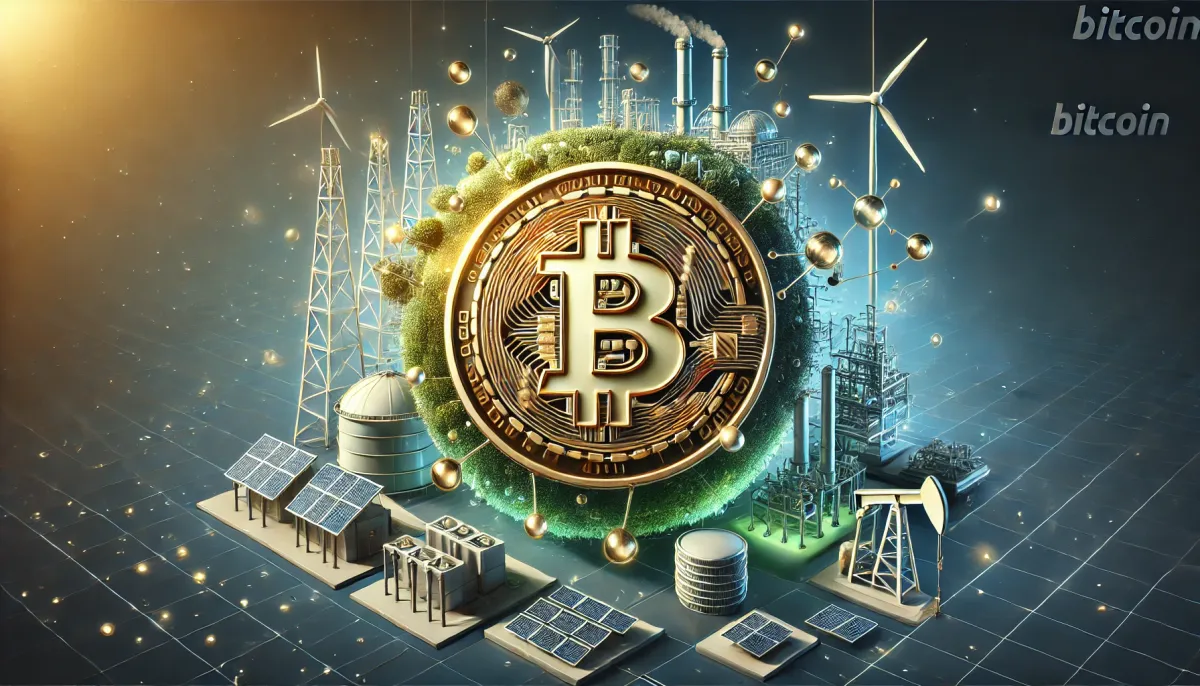Bitcoin Mining: A Key to Energy Grid Stability and Renewable Integration
The November 15, 2024 episode of the Financial Fox podcast features Dennis Porter, CEO of Satoshi Action Fund, discussing the critical role of Bitcoin mining in reshaping energy grids and enhancing renewable energy integration.

- My 'briefing notes' summarize the content of podcast episodes; they do not reflect my own views.
- They contain (1) a summary of podcast content, (2) potential information gaps, and (3) some speculative views on wider implications.
- Pay attention to broadcast dates (I often summarize older episodes)
- Some episodes I summarize may be sponsored: don't trust, verify, if the information you are looking for is to be used for decision-making.
Summary
Bitcoin mining is redefining energy systems by providing grid balancing, utilizing stranded energy, and mitigating methane emissions. The November 15, 2024, discussion on Financial Fox with Dennis Porter, CEO of Satoshi Action Fund, explores how mining can bolster renewable energy, reduce environmental harm, and overcome misconceptions through education and policy advocacy.
Take-Home Messages
- Bitcoin mining stabilizes grids during crises, providing dynamic load management unmatched by traditional solutions.
- Stranded energy monetization offers new economic opportunities, turning wasted resources into value.
- Methane mitigation through mining reduces greenhouse gas impacts, presenting a scalable environmental solution.
- Educational and regulatory initiatives are essential, countering misconceptions and fostering industry growth.
- Mining aligns economic incentives with decarbonization, supporting renewable energy integration and grid resilience.
Overview
Bitcoin mining is revolutionizing energy systems with its unique capacity to balance grids and support renewable energy. Dennis Porter highlights this in his conversation on Financial Fox, using examples such as Texas’s grid response during Winter Storm Uri, where miners contributed 1,700 MW of power to stabilize supply. This demonstrates mining’s ability to operate as a flexible, dynamic load that strengthens energy infrastructure during critical moments.
Beyond grid balancing, Bitcoin mining addresses stranded energy challenges by monetizing curtailed renewable energy and flared natural gas, which are otherwise wasted. This capability reduces environmental harm and improves renewable energy project economics, making investments in solar and wind more viable. Porter also emphasizes how mining mitigates methane emissions, a potent greenhouse gas, by capturing and utilizing vented methane (this is a paper I led, with Porter and miners as coauthors).
Despite these advantages, the industry faces challenges, including regulatory barriers, economic discrimination, and public misconceptions. Porter advocates for education and policy reforms to unlock mining’s full potential. By fostering collaboration among stakeholders and addressing misinformation, Bitcoin mining can emerge as a key player in the global energy transition.
Porter concludes with a vision of mining as not just a financial activity but a transformative tool for energy optimization, aligning environmental goals with economic incentives. This potential, however, depends on global cooperation and supportive regulatory frameworks.
Stakeholder Perspectives
- Policymakers: Seek clarity on mining's environmental benefits and potential alignment with decarbonization goals.
- Energy Providers: View mining as a partner for monetizing wasted energy and balancing variable renewable supplies.
- Environmental Advocates: Recognize mining’s role in methane reduction and curtailment minimization, while scrutinizing emissions.
- Investors: Evaluate mining as a dual-purpose innovation, combining financial returns with environmental benefits.
- Bitcoin Miners: Push for financial inclusion and regulatory clarity to ensure operational stability and scalability.
Implications
Bitcoin mining offers transformative solutions for energy optimization, but achieving its potential requires significant policy support and public education. By demonstrating tangible environmental benefits, mining can shift public and policymaker narratives, fostering broader acceptance. Policymakers must prioritize frameworks that align mining with decarbonization objectives while supporting grid stability.
For industries and investors, mining presents a pathway to sustainable innovation by integrating renewable energy, utilizing stranded power, and reducing environmental impacts. Scaling these benefits requires addressing financial discrimination and ensuring global regulatory coordination. If successfully implemented, Bitcoin mining can catalyze a cleaner, more resilient energy future.
Future Outlook
Bitcoin mining’s role in energy systems will expand as renewable energy adoption accelerates and grid stability becomes a greater priority. Its ability to monetize stranded energy and provide dynamic load balancing positions mining as a critical player in decarbonization efforts. Policymakers and energy companies must collaborate to integrate mining into energy strategies, unlocking both environmental and economic benefits.
However, public perception remains a challenge. Advocacy and research are needed to counter misconceptions and build trust in mining’s contributions. By fostering global cooperation and adapting to diverse regulatory landscapes, Bitcoin mining can solidify its position as an essential tool for sustainable energy.
Information Gaps
- How can Bitcoin mining’s environmental benefits be effectively communicated to counter media misconceptions? Public understanding is critical to driving support for Bitcoin mining. This question focuses on creating credible narratives that demonstrate mining’s role in sustainability.
- What is the economic feasibility of deploying Bitcoin mining operations near stranded energy sources? Addressing this gap could unlock untapped energy resources, aligning economic growth with environmental sustainability.
- How does Bitcoin mining improve the financial viability of renewable energy projects? This research would provide key insights into how mining can attract investments in renewables by reducing risks associated with curtailment.
- What are the root causes of banking restrictions faced by Bitcoin companies, and how can they be addressed? Financial inclusion is vital for scaling mining operations. Resolving banking discrimination ensures industry stability.
- How do monopolistic utilities perceive Bitcoin mining as a threat or opportunity? Understanding these perceptions is crucial for fostering collaboration and regulatory adjustments that encourage innovation.
Broader Implications for Bitcoin
Bitcoin Mining and Energy Policy
Governments should recognize Bitcoin mining as an energy optimization tool, capable of stabilizing grids and monetizing stranded energy resources. Policies encouraging mining operations to co-locate with renewable energy projects can accelerate decarbonization and improve grid reliability. Regulatory frameworks should prioritize balancing economic growth with sustainability goals, fostering a supportive environment for mining innovation.
Environmental Impact and Advocacy
The environmental narrative around Bitcoin mining requires a shift to emphasize its benefits, such as methane mitigation and reduced energy waste. Credible research and targeted advocacy are essential to counter misconceptions and align mining with global climate objectives. Collaboration with environmental organizations can amplify mining's role as a scalable solution for renewable energy integration and greenhouse gas reduction.
Financial Inclusion and Infrastructure
Bitcoin mining can bridge gaps in energy access by monetizing excess power in underdeveloped or remote areas. This creates opportunities for economic growth in regions with untapped energy resources. Integrating mining into energy policy frameworks can further enhance its potential as a tool for fostering equitable economic development and financial inclusion.
Renewable Energy Market Dynamics
Mining’s ability to monetize curtailed energy transforms the economics of renewable energy projects. By improving project viability, mining attracts investments that would otherwise be discouraged by variability risks. This dynamic positions Bitcoin mining as a key driver of renewable energy expansion and innovation in grid management technologies.
Global Adoption and Strategic Reserves
Bitcoin mining’s scalability across diverse regulatory and infrastructure environments highlights its potential as a tool for international energy strategy. Countries adopting mining as part of their energy portfolio can benefit from increased energy resilience and lower carbon footprints. Additionally, integrating Bitcoin into strategic reserves may align national economic policies with a decentralized, digital financial future.



Comments ()